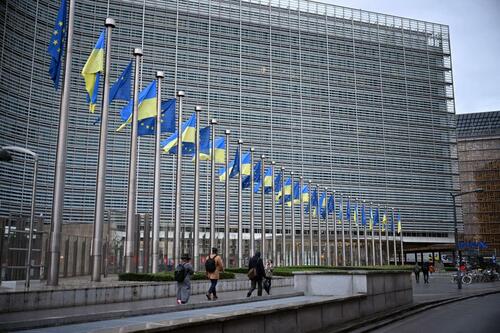EU Commission Mulls Joint Debt, Bilateral Grants To Plug Ukraine Funding Gap
By Thomas Moller-Nielsen of Euractiv,
The European Commission is considering plugging Ukraine’s colossal funding gap with cash raised from common EU debt and bilateral member state grants, according to three people familiar with the matter.
These two possibilities – which will be set out in a Commission “options paper” for Kyiv due to be circulated to capitals in the coming weeks – come in addition to the so-called “reparation loan” option.
The latter proposal seeks to use €140 billion worth of immobilised sovereign Russian assets held by Euroclear, a Brussels-based clearing house, to support Ukraine’s war effort and reconstruction.
The reparation loan is the Commission’s preferred option for supporting Ukraine despite Belgium’s refusal to back the scheme at a summit of EU leaders in Brussels in October, the sources said.
Many member countries – including Germany and the Baltic nations – share this sentiment.
Belgium successfully watered down last month’s Council conclusions, which ultimately tasked the Commission to draft “options” to support Kyiv’s financing needs that did not specifically mention making use of Russia’s assets, which were frozen after Moscow’s full-scale invasion of Ukraine in 2022.
Belgian Prime Minister Bart De Wever has pledged to block the reparation loan scheme unless other member states share legal and financial risks associated with the loan, and other EU countries harness Russian sovereign assets held in their own jurisdictions alongside Belgium.
The Commission estimates that €25 billion worth of Russian sovereign assets are held in the EU outside Belgium. Germany, France, and Luxembourg are among the other EU countries believed to hold some of the assets.
De Wever also floated the idea of using common debt to support Kyiv after last month’s Council.
“The big advantage of debt is that you know it,” De Wever said. “You know how much it is. You know how long you will bear it. You know exactly who’s responsible for it. The disadvantage of the Russian money is that you have no idea how far the litigation will go, how long it will take, and what you will encounter in problems.”
Continue reading at Euractiv
Tyler Durden
Sat, 11/08/2025 – 08:10ZeroHedge NewsRead More





 R1
R1
 T1
T1


